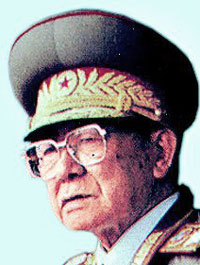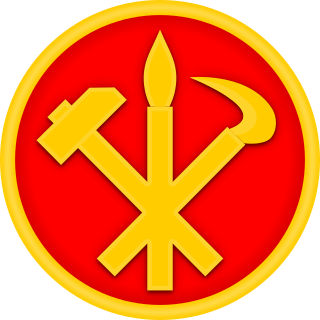Functions and structure
The Third Floor Secretariat is technically subordinate to the Party Central Committee but operates under the direct control of Kim Jong Il and later Kim Jong Un. Access to the Secretariat and its personnel is strictly restricted; Central Committee officials are prohibited from interacting with them without explicit authorization from the General Secretary. Even members of the Third Floor Secretariat are not permitted to use the conventional state communication lines, using separate networks, and often communicating in extremely complicated and convoluted "codes". The secretariat was established to consolidate Kim Jong Il's control over North Korea during his rise to power, centralizing decision-making and preventing inter-departmental communication. By controlling the flow of information to his father, Kim Il Sung, Kim Jong Il effectively became the de facto leader of North Korea in the 1970s, reducing his father's role to that of a symbolic figurehead.
The secretariat managed essential functions, including overseeing paperwork, coordinating Kim Jong Il's schedule, ensuring security, and handling logistical operations. The Secretariat also includes other departments and offices which manage the Kim family's residential and domestic life (chefs, food, and housekeeping). Several offices manage Kim Jong Un's personal financial holdings and expenditures, as well as purchase goods (food, furnishings, and appliances/technology) in Europe and East Asia. The Personal Secretariat links to the "Offices of the Third Floor", which collects intelligence, manages legitimate and illicit overseas businesses, and ensures other revenues from state owned enterprises and party-owned trading corporations are used, in part, to finance the Kim Family's private and household life. [2]
Though it included advisors with whom Kim Jong Il discussed policies, the secretariat itself was not authorized to initiate or formulate policy, preserving North Korea's centralized ideological control. This structure maintained strict control over information and limited inter-departmental collaboration, centralizing all decision-making within the Kim family's inner circle. North Korean ministries were restricted from accessing comprehensive information on issues, ensuring that only the secretariat had a complete understanding of various matters. This centralized authority enabled Kim Jong Il to exert nearly absolute power, as all information and decisions had to pass through the secretariat before reaching him, effectively eliminating independent channels of authority. While the secretariat did not create policies, it served as the primary interface between the Kim family and the North Korean government, managing information distribution and facilitating decisions on major state matters, giving it an indirect yet significant role in shaping decisions. According to Tae Yong-ho, the secretariat's influence was immense; given the overwhelming volume of reports—sometimes amounting to thousands of pages daily from each ministry—Tae speculated that Kim Jong Il likely did not read each document directly. Instead, Secretariat officials likely filtered information, presenting only the most critical reports to him, allowing trusted aides to handle routine decisions.
Consolidation Division
The Consolidation Division, often regarded as Kim Jong Un's gatekeeper, manages the flow of reports, documents, and policies that reach him. It coordinates with the Organization and Guidance Department, State Affairs Commission, and the General Affairs Department to handle paperwork and document delivery to the secretariat. [2] North Korean ministries are required to submit two types of reports: weekly strategic reports and daily reports on routine issues. The weekly reports, submitted every Wednesday, provide in-depth analysis and do not require immediate sign-off from the Kim family. In contrast, daily reports address more urgent, everyday matters needing prompt approval. Until the early 1990s, these reports were faxed to the secretariat; however, Kim Jong Il later switched to email.
When Kim reviewed a report, he would either sign it or date it, designating it as a "document personally signed and ratified." Reports he simply reviewed and returned were marked as "documents viewed [by the leader]" or "Central Committee orders." The most important documents were those with his personal signature or specific instructions. According to defector Tae Yong-ho, there was no way to confirm whether Kim Jong Il personally read each report, only skimmed the titles, or ignored some entirely. The volume of reports was overwhelming—thousands of pages from the foreign ministry alone, replicated across other ministries. Tae speculated that the Consolidation Division likely filtered the reports, sending only the most critical ones to Kim while making decisions on his behalf for the rest.
Office of Secretaries
The Office of Secretaries manages foreign affairs. It is responsible for the reports and communications submitted from diplomatic representatives. It also collects reports from, and manages, Kim Jong Un's unofficial overseas network that submits information and sometimes procures items for him. [2]
Office of Adjutants
The Office of Adjutants oversaw the Kim family's bodyguard corps and supervised the Supreme Guard Command, responsible for the security of the Kim family. It also collaborated with the Guard Command's Security Department to manage Kim Jong Un's communications systems, including telephone, fax, and internet facilities. [2]
Cadres' 5th Section
The Cadres’ 5th Section recruited, trained, and staffed groups of female entertainers, including singers, musicians, and dancers, to perform for the Kim family. The 5th section selects female students ages fourteen to sixteen, with the process including medical exams, document screenings, interviews, before being selected for specialized training. This may include entertainment but also nursing, security, household management, and communication services. After selection, they are commissioned as officers in the military and are either sent to the Supreme Guard Command, Ponghwa Hospital, while the most beautiful and talented are sent to the Kim Family as phone operators, typists, bodyguards, nurses, or the infamous "Kippumjo", tasked with providing various forms of entertainment and sexual activity for the government elite and occasionally distinguished guests. The Wangjaesan Light Music Band and the Pochonbo Electronic Ensemble are under the jurisdiction of the 5th Section.
Office #35
The External Investigations and Intelligence Department- Office #35 manages and coordinates intelligence collection, analysis, and operations primarily concerning South Korea, Japan, Europe and North America. As part of a 2009 consolidation, it was technically subordinate to the Reconnaissance General Bureau and vice chairman General O Kuk-ryol. However Officer #35's director reports through the Third Floor Secretariat and is un-officially, the main supervisor over the Reconnaissance General Bureau and possibly the Ministry of State Security. Under the Bureau, it is grouped with the Workers Party Operations Department, United Front Department, and for certain missions, the Ministry of State Security. Office #35 operatives have been implicated in weapons and narcotics trafficking to earn foreign currency to support intelligence collection operations. Within the Third-Floor Secretariat, Office #35 provides raw information from media sources and human sources which are used in the production of intelligence briefings for senior leaders. [2]
Office #38
Office #38 is responsible for managing the Kim Family's finances, particularly the technical and logistical administration of Kim family funds. Office #38 controlled a network of holding companies involved in various legitimate hospitality, retail and restaurant businesses within North Korea and other Asian countries. Some Office #38 operatives were involved in acquiring a variety of goods from abroad, including appliances and technology such as MP3 Players, televisions, video players, automobiles, speedboats, furnishings and fixtures for elite housing, as well as foodstuffs and alcohol. Some of these goods are for the use the Kim family and subordinates while other goods are given to party, government, and military elites to maintain loyalty. [2]
Office #39
Office #39 is the primary manager of a network of legitimate and illicit companies for earning foreign currency for the Third Floor Secretariat. Office #39 began as a subunit Central Committee's Finance and Accounting Department in the 1970s to sell gold and other minerals from mines, but officially became an independent party department in 1988, reporting to the Third-Floor Secretariat. Office #39's companies have been implicated in cigarette bootlegging, documents and insurance fraud, currency counterfeiting and narcotics manufacturing and trafficking (poppies and methamphetamine). Office #39 also ensures foreign currency earning enterprises remit a percentage of their revenue to the Kim family. [2]













